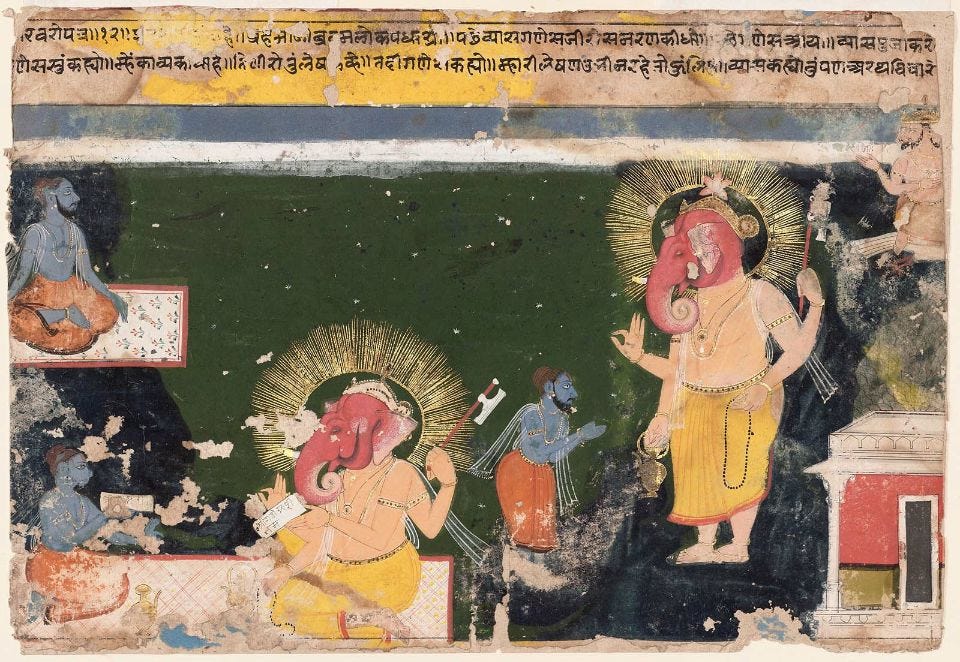Jayary Newsletter # 66

A Digestive Dilemma
I keep wanting to tell Nala and Damayanti's story but each time I do so, I am tripped up by it like a piece of burning coal I have swallowed and can't digest or spit out. The digestive dilemma is simple: what does it even mean to read the Jaya today? Or to write it?
It's not a new problem, for it's the self-appointed task that started my reading project more than a year ago now, a project that has intensified this year with the daily Jayary. However, it's a problem that's become deeper and harder as I read.
Underlying those difficulties is a diagnosis: the problem isn't one of translation, i.e., of asking how to learn from these texts in today's world. The problem is much deeper, to ask ourselves how to inherit a tradition that has been severely disrupted by the forces of the modern world?
European and American writers and scholars have the same problem; their familiar world is also being disrupted, but at least they have a continuous five hundred year old tradition they can develop. Starting with Cervantes and Shakespeare in literature, Galileo in Science and Descartes in philosophy there's a sense of what it means to be cultured.
Now imagine that person reading a much older text, say, the bible. For all the clash between the church and the state and between science and revelation, a western scholar can read the bible with all the apparatus that's been developed within their culture: from literary sensibility and linguistic analysis to philosophical grammar.
What do we have in response? How can we even read the Jaya in the absence of continuity? I am not saying it's a futile task; rather, I am saying it's a great challenge, but one we should approach with an understanding of its enormity.
Damayanti Holmes
Where there's smoke there's fire. But how do you know it? What if it's dry ice instead? There's only one way to solve the problem, best summarised by Sherlock Holmes' famous saying: "How often have I said to you that when you have eliminated the impossible, whatever remains, however improbable, must be the truth?"
Damayanti is one step ahead of Sherlock. She doesn't wait for the data to appear at her doorstep; instead she entices it to come to Vidarbha with the ruse of a swayamvara. Having brought Rituparna and Bahuka to her father's court, Damayanti runs some field experiments to see if Bahuka is indeed Nala.
In the first experiment, she sends her companion, Kesini, to check on Bahuka's cooking. He's a magical cook, turning water into wine (I know, I know, it's the wrong religion) without even touching the pots. One impossibility removed.
Then she asks Kesini to sneak her a morsel of Bahuka's cooking without his noticing. The spoonful of meat tastes exactly like Nala's dishes. More power to Nala - it's clear he used to cook for Damayanti all the time. Another impossibility removed.
Then Damayanti sends her twin children to Bahuka, who gathers them in his lap and weeps like they were his own blood before sending them away. The impossibles are vanishing fast.
Damayanti Holmes is convinced that Bahuka is none other than Nala. Now she faces a different problem: the smoke has led her to the fire, but you can't cook on smoke. The fire needs to reveal itself.
Reunited at Last
Damayanti persuades her parents that Bahuka is none other than Nala and goes to his quarters.
"Do you know a man who abandoned his wife after she's been with him throughout his trials? Is there anyone else besides Raja Nala who's done so?" asks Damayanti of Bahuka.
Bahuka replies: "It was not Nala who rejected you; it was Kala who took over my body and made me do his bidding. I have ejected him and he's no longer in control."
He doesn't stop there though, for a doubt is nagging him. Remember, Nala and Damayanti's chronicle is one of chance and uncertainty. Dice are responsible for Nala losing his kingdom. Damayanti has to overcome her doubts in order to narrow upon Bahuka as Nala in disguise. The doubts don't end there: Nala is worried that Damayanti has given up on Nala, that with the swayamvara she's making herself available to other kings. "Are you still mine?" says Bahuka to Damayanti.
If I were her, I would ask him what right he has to pose that question. The insanity defence only goes so far.
Damayanti invokes the gods as witness and declares that she's been faithful to Nala the entire time. That she hasn't committed infidelity even in her dreams. The gods corroborate her testimony. Nala's convinced; he invokes the Naga king Karkotaka's blessing and is restored to his original form. After four long years of separation, Nala and Damayanti are reunited.


